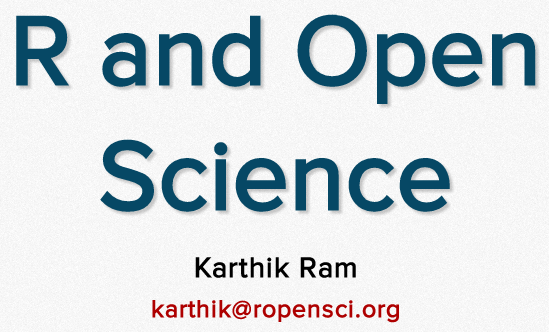Dare to share
Posted on July 11, 2012
Last night at the Bay Area useR Group July meeting, we had the opportunity to listening to Norman Matloff and Karthik Ram.
Norm started the session with a presentation on his "Rth" package. But the main
dish was in charge of Karthik who spoke about R’s role in facilitating
open science. You can check his slides
about R and Open Science.
From all the very interesting stuff mentioned by Karthik, the two main key ideas that resonated in my head after his talk were sharing and collaboration.
Basically, the main idea behind the open science movement can be put this way:
Open the doors for the entire (scientific) community so everybody can see how you do your research.
Open science is much more than showing people what you do; open science is more about showing people not only what you did but more important HOW you did it. Writing a paper and making presentations help you show the things you do, but they don’t actually show the details of how you do them. And you know: the devil is in the details.
Only when you dare to share is when you finally show the rest of the world how you do the things you do. The little problem, however, is that may of us refuse to share our data, our code and our tools, mainly because we are afraid of the pirates and thieves that might steal all our precious work. It is true that this is a real threat but I think that the benefits outweigh the risks of adopting the open science philosophy.
Let me give you some of the benefits of sharing:
-
First, it is perfect for providing your work a longer lifetime! Just think about the tons of works that are now in oblivion inside some hard-drive of flash-drive without never watching the screenlight again. For instance, consider all those years of hard work that takes a grad student to get her PhD, with the corresponding data tables, code scripts, results, graphics, and so on. By sharing your work, you’ll allow it to have a larger impact.
-
Second, by showing other people how you do your research, your colleagues can try to replicate your analysis, validate it, confirm your findings, and give you more recognition. It increases the chances of getting more citations, and also to become a reference for future applications.
-
Third, it can serve your future you. As Kharthik remarked it “most science is not reproducible or repeatable, even within the same lab group over time”. This is a very strong reason to share your data and code, so you or anyone else in your lab, some time in the future, may reproduce/repeat the obtained results.
-
Fourth, it will force you to make sure that your data and code are as cleaner as possible. Of course, there will always be cases when some errors and bugs are still around, but here is where the external scrutiny comes handy because other users might detect something wrong that scaped your eyes.
-
Fifth, it will open new opportunities for collaboration. Since other researchers can actually see how you do what you are doing, they may be interesting in collaborating with you because they know how you work. An who knows, you might even get contacted by companies or recruiters interested in someone with your profile and skills.
So, next time you doubt about whether you should opening your science to the world, go for it and dare to share. If you want to know more about open science and R please check Ropensci: a collaborative effort to develop R-based tools for facilitating Open Science.
